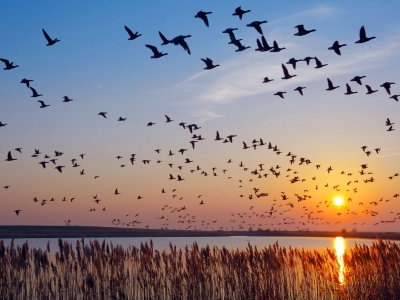
Starlings are medium-sized passerine birds that are famous for gathering in huge flocks and moving across the sky in sync to form startling ‘murmurations’. Between October and February every year, millions of starlings migrate from northern Europe to Central and Southern Europe to escape the cold. But scientists have lately observed that warmer temperatures in northern European caused by climate change have shortened the starlings’ stay in Southern parts. Studies have predicted that warmer temperatures could also make starlings advance their breeding period.
Though one would be fascinated by the sheer number of the birds in the flock (pre-roost murmurations have been known to number as many as 1,00,000 birds), many roosts are significantly smaller than they used to be due to population decline. Lack of food and habitat loss, partly driven by climate change, have put some of the starling species on the IUCN red list in various Europe countries. (IUCN- International Union for Conservation of Nature). Starlings are not alone in this struggle. Many birds around the world are impacted by climate change. The timing of bird’s migration, nesting, hatching, and feeding are adapted to specific conditions, such as the availability of suitable habitat and adequate food sources. These factors make birds particularly vulnerable.
Here is a closer look at the threats faced by birds due to a warming planet.
Migration pattern
The impact of climate change on birds migration patterns has been noticed in the last few decades. Scientists have documented that fewer birds show up in breeding and wintering grounds and they attribute it to the increasing temperatures, changing vegetation, and extreme weather conditions.
Birds synchronise their migratory movements with seasonal changes. The start of their journey and their speed must match the life cycle (before caterpillars pupate) of food sources at the stopover and destination sites. But these environmental cues go for a toss with changing climate.
Habitat loss
One of the major effects of climate change is the loss of habitats. While some species face shrinking ranges, others face habitat destruction. For migrating birds, flooding or desertification could spell doom. Flocks might fly thousands of kilometres only to find their destination submerged or barren. Many goose species use the Siberian tundra’s rocky bedrock to raise their offspring. But increasing temperatures make the permafrost soil to thaw and change the habitat completely, making it impossible for the geese to breed.
Lack of food
A number of birds has adjusted breeding times to match early Spring. They arrive at the breeding site earlier than before.
Meanwhile, increasing temperatures also make the vegetation bloom and insects hatch earlier at the site. But sometimes these shifts are not in line with each other. As a result, the chicks hatch way after the caterpillars are gone. And so, they starve. (On average, the window of time when birds lay their eggs has gotten earlier by almost two weeks over half-a-century. Since many small songbirds can raise their young in roughly one month, two weeks is a big shift in their timing.)
Sea-level rise
Sea-level rise and erosion alter coastal wetlands. Many birds, such as piping plovers, that inhabit coastal areas lay their eggs directly on the sand of the beach in a shallow depression. The erosion of beaches and storm surges can cause nests to be lost to the ocean.
Smaller body, larger wings
A study published in December 2019 found that global warming was causing birds to shrink and their wingspans to grow in size. Scientists explained that it could be an adaptation of birds as smaller birds are better at cooling off, losing, body heat more quickly due to their larger surface-area-to-volume ratios. But smaller body size means less energy available for the birds to complete long journeys. Scientists say that birds would have evolved to grow long wings to compensate for their smaller bodies as it helps them survive migration.
Picture Credit : Google




